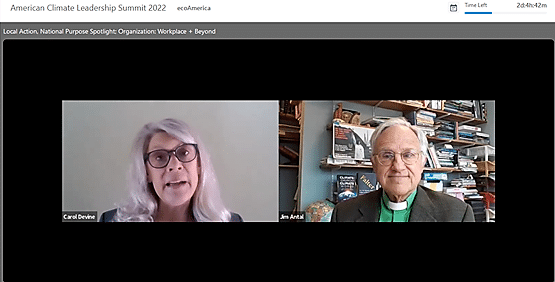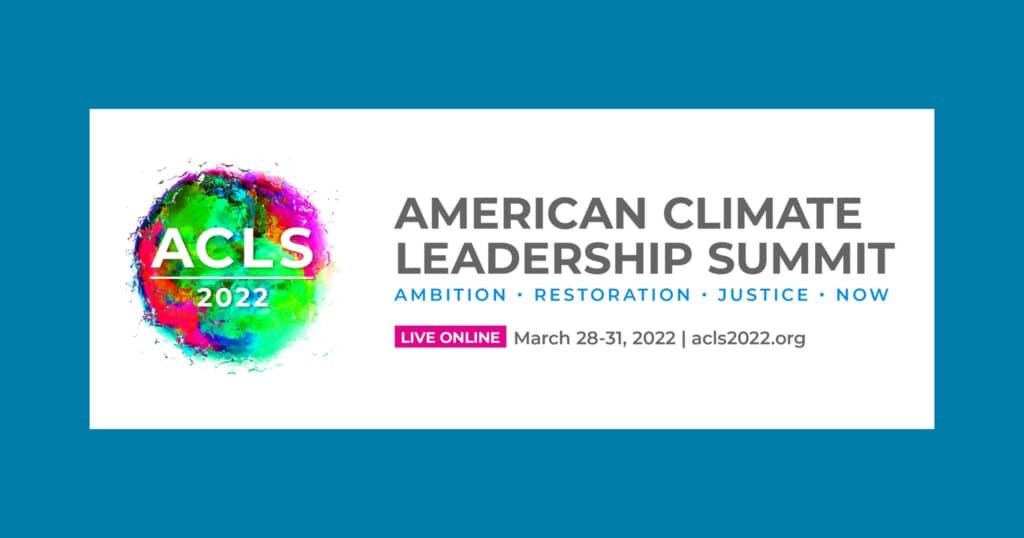Climate summit speakers urge churches to act now — and act like a jazz band
Small steps churches can take right now were part of it. So were big, inspirational ideas — like jazz as a model for fighting climate breakdown.
The American Climate Leadership Summit, held online March 28-31, brought people together from science, business, religion and other disciplines.
What people of faith can do to slow Earth’s warming came up often during the annual event, sponsored by ecoAmerica. Its interfaith arm, Blessed Tomorrow, led several of its sessions. The United Church of Christ was a sponsor — and the source of two notable speakers. Videos of the summit’s sessions are here, at ecoAmerica’s YouTube channel.
How to start now
As part of a March 29 segment, “Local Action, National Purpose,” the Rev. Jim Antal listed ways for people of faith to have an impact. A retired UCC pastor and Conference minister, he serves as special climate advisor to the church’s general minister and president.
Getting started can be as easy as getting people talking, he said. “Watching a brief video and then engaging in discussion is a great first step.” For churches, he recommended a series of nine videos, each 5 to 6 minutes long. They feature climate scientist Katharine Hayhoe, one of the summit’s keynote speakers — and herself an evangelical Christian. The topics of the videos range from what the Bible says about the natural world, to how to talk to people with different opinions about climate change, to why “it is not too late” to slow the global rise in temperature.
The UCC, too, offers food for thought with two climate webinars coming in April:
- Wednesday, April 13, at 1 p.m. ET: “Getting Ready for Earth Sunday: Resources for Congregations.” Earth Sunday this year is April 24.
- Saturday, April 23, from 10:30 a.m. to 12:45 p.m. ET: “The Faith of Prophets: Lessons for the Climate Crisis.”
Steps to take
Besides reducing their carbon footprint, Antal described these steps that congregations can take:
- Download and train. Lots of help is available online. He mentioned, for instance, Blessed Tomorrow’s downloadable resources and “ambassador trainings.”
- Invite testimonials. He described churches that include, in worship, “a 1-minute climate testimony.” A member “shares something they or their family have done in response to the climate crisis: installed solar panels, called their congressperson, reduced their meat consumption, decided to have only one car, started bicycling to work. Hearing such testimony inspires others to take action.”
- Encourage grief. This, he said, “involves making your house of worship a safe place where people can honestly process their grief over the degradation of the earth we love. Religious tradition teaches us that our grief can serve as a precondition of hope.”
- Don’t go it alone. “Link up with others,” he said. “Join with other congregations to sponsor a speaker. Connect with a local chapter of the Sierra Club or 350.org. Or check out Bill McKibben’s Third Act, for people 60 years old or older.”
- Be visible. “It’s important for people of faith to show up at marches and rallies,” he said. Locally, these might support “solar and wind power, installation of heat pumps in cities or towns, creation of bike lanes or city parks or gardens, and other creation-healing events. Creation-loving citizens can also show up to protest a proposed pipeline, or to urge the closing of a gas or coal-fired power plant.”
- Advocate and vote. “Supporting aggressive policies and passage of laws to restore God’s creation is not a partisan exercise. It is right and good for the church, the synagogue and the mosque to advocate for the restoration of God’s creation, the elimination of racial inequity and the transformation of economic inequality. Because all three of those are related.”

Urge clergy to lead
Religious leaders must play a role in all of this, Antal said — and people should expect that of them. “Help them recognize that the climate crisis is humanity’s greatest moral challenge, and that, as moral and spiritual leaders, your clergy must address the climate crisis,” he said.
“Whatever social issue your congregation cares about – it might be hunger, it might be homelessness, racial inequality, economic inequity, war – … the climate crisis is already making it worse,” Antal said.
“And remember: once your clergy leader begins to offer climate leadership from the pulpit, more and more members of your congregation will begin to engage the greatest moral challenge and opportunity of our lives.”
A climate focus can energize people, said the moderator of the session, the Rev. Carol Devine. A Christian Church (Disciples of Christ) minister, she is program director of Blessed Tomorrow. “The congregations and houses of worship that I know of that are most involved in this work are thriving,” Devine said. “They have energy and passion. People walk into those spaces and feel the energy and the relevance.”
‘A jazz narrative’
A dire United Nations climate report, issued just weeks earlier, added urgency to the summit. Speakers stressed that no single sector of society can solve the climate crisis alone.
One of them was the Rev. Otis Moss III, senior pastor of Chicago’s Trinity UCC. In a panel session titled “Caring for Creation in Congregations and Communities,” Devine invited him to talk about jazz as a model for climate activism. Jazz, blues and faith have been a topic of Moss’s sermons and lectures, including “Stay Woke: Remaining Conscious in an Unconscious World” and “Blue Note Preaching in a Post-Soul World.”
Moss encouraged climate activists to improvise together — like a jazz ensemble.
Not only, he said, does jazz use an assortment of “instruments that are supposedly not supposed to play together.” It also involves “the kind of band with the necessary specialists” who are willing to play democratically.
Each specialist must sometimes step forward as a soloist within the ensemble — “in other words, elevating their work within the civic arena,” Moss said. And yet, he said, “all are playing in the same band, moving in the same direction. To address the climate crisis we have to have a jazz narrative.”
Content on ucc.org is copyrighted by the National Setting of the United Church of Christ and may be only shared according to the guidelines outlined here.
Related News
A Prophetic Call for Justice and Peace in Palestine
The executive leaders of the United Church of Christ have issued the following statement...
Read More‘Love is Greater Than Fear’: Regional Youth Events get to the heart of gospel message
United Church of Christ teens attending this summer’s Regional Youth Events (RYE) are...
Read MoreUCC desk calendars available to order now
Prepare for your day, month and year with the United Church of Christ desk calendar —...
Read More


